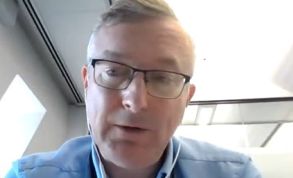HFMA Wales conference: Hold on to progress to advance transformation plan
Opening the HFMA Wales Branch/ACCA annual conference, which is taking place virtually this week, Dr Goodall said he was proud of the service’s response to the pandemic. The local NHS had shown flexibility in setting up new services and had pulled together to support additional co-operation between health and social care bodies.
But, while maintaining the Covid response, the service could use the fresh impetus it has found from being more flexible and collaborative to implement A Healthier Wales – the long-term plan for health and social care.
‘The approach to decision-making has been more urgent, allowing us to do things in 24 to 48 hours that would have taken seven months previously,’ he said. ‘The video conferencing platform for primary care took four-and-a-half weeks – it probably would have taken seven or eight years. That was an extraordinary example of transformation.’
'Partnerships have been really important. I want to hold onto that.'
He added that the virus had highlighted underlying health inequalities locally – Wales has the highest shielding population in the UK.
A strategic response was needed. As set out in the Winter protection plan, published last week, NHS Wales must focus on preventing four harms over the winter period. These included the harm from: Covid itself; an overwhelmed health and social care system; reduction in non-Covid activity; and wider societal actions or lockdown.
Dr Goodall added that transformation mechanisms must remain in place, building up and bringing forward plans as much as possible. Governance – both finance and corporate – must be maintained as a high priority.
‘If we are not careful, some patients could be left without an outcome on the waiting list, for example. We have already seen a deterioration in the waiting lists, but we still have an ongoing obligation to the patients. We need a strategic long-term approach, including funding. We are clearly not going to resolve it in the winter months, but we will recover as much as possible.’
Steve Elliot, deputy director of finance at the Welsh government health and social services group, described how health and social care was initially due to receive an additional £421m in 2020/21 to help implement A Healthier Wales. But this figure increased when the impact of Covid became clear.
The receipt of Barnett consequential funding from Westminster and the reprioritisation of budgets across Welsh government departments, had boosted health and care spending by over £1bn.
Monthly spending (Table B3) reports by health boards supported the NHS case for this funding. ‘Table B3 was an important piece of evidence for us to go back to seek additional funding for the NHS. In early August, the finance and health ministers were able to announce a further £800m stability package to help the NHS, taking the total funding to £1.3bn. The word “stability” is important as it’s a package of funding to help the NHS get through the winter period.’
He said allocations for the rest of the financial year would be confirmed shortly, while the operating framework for quarters 3 and 4 would also be published. Some funding would be held nationally for expenditure on Test, Trace, Protect, personal protective equipment and the set up and decommissioning of field hospitals. Independent sector contracts have been agreed until the end of December, while funding for care packages will also need to be considered for the rest of the financial year.
‘The quarter 3 and 4 framework will reflect increasing return of essential services, but given where we are in winter it’s not likely that routine care recovery will be significant. However, there are areas where we are trying to restart such as diagnostic activity, where we need to invest.’
The conference continues until 25 September. Click here for more details
Related content
We are excited to bring you a fun packed Eastern Branch Conference in 2025 over three days.
This event is for those that will benefit from an overview of costing in the NHS or those new to costing and will cover why we cost and the processes.